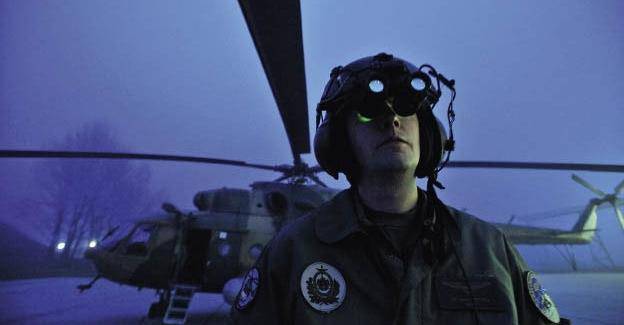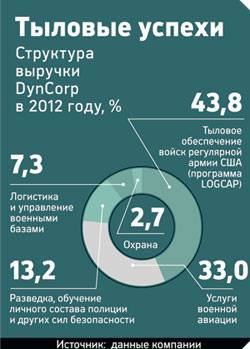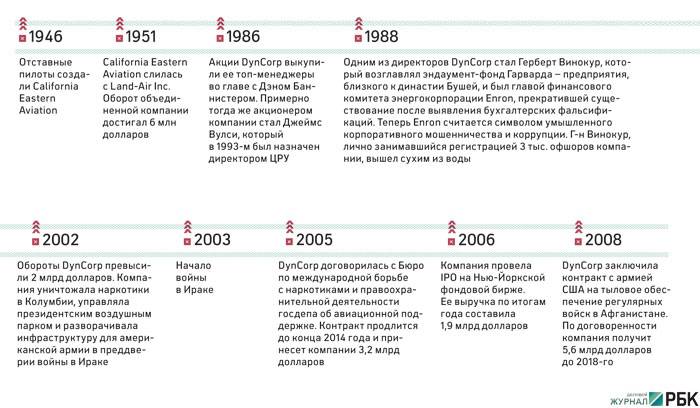Soldiers on call

In 2001, 10, thousands of Ecuadorian farmers, filed a class action lawsuit against the little-known American firm DynCorp: they were accused of torture, infanticide, and injury. It turned out that a private company, under a contract with Washington, had destroyed from the air with toxic herbicides the coca fields in Colombia, sometimes engaging in gunfights with local partisans. And in this war with drug addiction hooked neighbors. The Columbia Plan cost the state budget 1,3 billion dollars, and the main contractor for the project was DynCorp, which had been in the shadow of many years. Its turnover at the beginning of zero reached 2 billion dollars, and she not only conducted military operations instead of the Pentagon, but also protected Afghan leader Hamid Karzai, ran the US President’s fleet, defended her country’s border with Mexico, and even produced a vaccine against smallpox and anthrax. Until now, the company received about 90% of revenue from US government agencies, primarily through the military line. However, now government defense spending is allowed under the knife. End of prosperity? DynCorp doesn't think so. They say that they are sent in search of contracts to Europe, Australia and Africa.
First of all planes
It all started with a small airline, California Eastern Aviation. It was created in 1946 by military pilots who returned home after World War II and decided to try themselves in business. There was nothing unusual in the company; a lot of such enterprises appeared at that time. But few of them became the largest contractors of the Pentagon and special services. California Eastern Aviation didn’t have everything at once. At first, they transferred cargo from the west coast of the States to Asia, where the separation of Korea took place and tensions escalated, resulting in 1950 in the Korean War. With the outbreak of hostilities overseas, the company began to serve the White Sands missile range in the state of New Mexico. And then she didn’t calculate her strength a bit and was on the verge of bankruptcy. The merger with another similarly private company Land-Air Inc., which was engaged in the maintenance of airfields, helicopters and airplanes, saved from ruin. Having received new knowledge, the company signed a contract with the US Air Force for the provision of services. According to various sources, the revenues of the combined company, named Dynalectron Corp., reached 6 million dollars.
In 1966, the United States Administration and Budget Administration issued a circular in which it called on the government to outsource as many functions as possible. “The competitive system of enterprises, which is characterized by initiative and freedom in decision-making, is the main source of our economic strength,” the document said. In 1980, President Ronald Reagan turned this recommendation into defense policy and contracts into Dynalectron. But why exactly there? In the company itself, such questions are answered traditionally - pathetically and unoriginally. The representative of the company Ashley Burke explains everything professionalism and highly qualified specialists. That is why the White Sands Missile Range for 50 years has not changed the contractor, and the contract with the US Air Force, signed on 1951, has been extended for several decades. In addition, few of those post-war firms set up by retirees lasted long afloat. And there were no new companies capable of taking up work with army units. That is, Washington, in general, did not have a choice to whom to transfer its defense functions. However, among political scientists and those journalists who tried to figure out stories the success of Dynalectron (in 1987, it changed its name to DynCorp), another version is also popular: the largest private military companies (PMCs) were used by the highest ranks for the development of public funds.
Even in our time, when the activities of PMCs have ceased to be in the shadows, the Pentagon selected contractors at its discretion without any tenders. “We know that such contracts are distributed in conditions of limited competition, and even in its absence. For example, the contract for logistic support of the US Army in hot spots in 2001 was signed with Halliburton without a contest, ”says Peter Singer, leading researcher at the Brookings Institute. What played in favor of this PMC? Surely, not least, the fact that Dick Cheney, Halliburton, who served as Secretary of Defense in 1989 – 1993, and with US Vice President from 2001, led the Halliburton for several years.
"Parents" DynCorp not so eminent. But at different times the company was not led by the last people in the military sphere. So, when the Senate held hearings on the appointment of CIA director James Woolsey in February of the Senate, it turned out that he was the director of DynCorp from 1993 to 1988. Before that, he also worked as deputy commander of the US Navy. According to the transcript of the hearings, Mr. Woolsey stated that he had 1989% of PMCs from the beginning of 1980, and asked to keep these securities in ownership, promising to withdraw from making decisions that could conflict with DynCorp interests. In addition to him, the company's top managers were retired General Barry McCaffrey, who had previously dealt with drugs and headed the southern command of the army, General Richard Holi, former head of one of the US Air Force divisions, Michael Thibault, who worked as deputy director of the agency of the Defense Ministry, and others The Republican insider, founder of the Hamilton Securities Group, Katherine Austin Fitts, believes that DynCorp was something of a retirement welfare fund for senior government officials. However, an extremely effective fund, because, despite the connections, DynCorp always looked back at the market and changed in accordance with the situation.
Get off the needle
 “One of the main distinguishing features of the company’s management is its constant focus on diversification,” says Ivan Konovalov, director of the Center for Strategic Market Studies. In the early 1990s, when US authorities began cutting back on military spending, one of the directors of DynCorp, a former trade official fleet Paul Lombardi, insisted on the development of information and telecommunications. The company bought up 19 IT firms and very quickly became able to offer government agencies communication services and ensure its security. According to Austin Fitts, in a matter of years, the company began managing financial data and other electronic documents from more than 30 government agencies, including the FBI, the Department of State, the Department of Justice and Defense, the Federal Bureau of Prisons and all US embassies.
“One of the main distinguishing features of the company’s management is its constant focus on diversification,” says Ivan Konovalov, director of the Center for Strategic Market Studies. In the early 1990s, when US authorities began cutting back on military spending, one of the directors of DynCorp, a former trade official fleet Paul Lombardi, insisted on the development of information and telecommunications. The company bought up 19 IT firms and very quickly became able to offer government agencies communication services and ensure its security. According to Austin Fitts, in a matter of years, the company began managing financial data and other electronic documents from more than 30 government agencies, including the FBI, the Department of State, the Department of Justice and Defense, the Federal Bureau of Prisons and all US embassies.To 2003, about half of the company's revenues came from IT services. However, the flow of military money, despite the expectations, did not dry up: after the catastrophe in September, 2001 th was launched to finance the fight against terrorism, and in 2003, the war in Iraq began. So a year later about 40% of revenue came from paying for the participation of DynCorp employees in combat operations in the Middle East. Turnovers have been growing dynamically for several years, and, despite statements about diversification, PMCs are again addicted to defense contracts. At first, she fed on income from Iraq, and after the withdrawal of American troops from there, she switched to Afghanistan, where she was engaged in the logistic support of the regular army for about $ 1,7 billion a year. Now, however, the US authorities are again talking about the sequestration of the military budget. This is caused by a shortage of finances and the end of major armed conflicts. Will the market change?
According to the UN, the business of private armies in 2012 has grown to a turnover of 100 billion dollars. And perhaps this is a peak indicator: experts believe that the sector will shrink. How much - no one forecasts yet. But the fact that the decline will still occur is evidenced by the already beginning deterioration in the financial results of some players. Thus, in the second quarter of this year, DynCorp reported a drop in revenue by 9%, to 876 million dollars, due to a reduction in the "Afghan" budget. And in the 2014-m States and did withdraw their troops from Afghanistan. “In 2008, the company received a contract for logistical support in this country for 5,6 billion dollars. It will last until 2018, and this will save DynCorp business for some time. But the scope of work will be noticeably reduced, ”says Doug Brooks, president of the American International Stability Operations Association. Meanwhile, DynCorp competitors are already radically rebuilding their companies.
Now we go to you
Private armies, according to Shaun McFight of the National Defense University of America, are beginning to look for new niches. The hope of many is the corporate sector. Industrial enterprises and firms in the service sector open their offices and branches in those countries that are not distinguished by political and military stability, and they can benefit from all the competencies that PMCs have. So far, no major contracts have been signed in this direction, but negotiations are already underway. For example, the oldest firm of this kind, Academi (formerly Blackwater), expects to reduce the share of revenues from government structures from 90 to 50% in the next three years, replacing them with income from energy companies and hotel chains operating in East and South Africa. Academi is already building a large center on the Black Continent to train employees of its future clients.
 In DynCorp, they are not going to go this way yet. “Those who are trying to completely remake themselves are doomed to a difficult struggle,” said company president Stephen Geffney in the spring. He said that DynCorp will continue to develop the areas in which it operates: air transportation and air services, police training, fighters of the regular army and special services, logistics services and personal security. Only that which many competitors have abandoned is added - international expansion. Mr. Gaffney intends to offer "for rent" his army to the governments of the UAE, Australia, as well as countries in Europe and Africa. But do we need American “soldiers of fortune”?
In DynCorp, they are not going to go this way yet. “Those who are trying to completely remake themselves are doomed to a difficult struggle,” said company president Stephen Geffney in the spring. He said that DynCorp will continue to develop the areas in which it operates: air transportation and air services, police training, fighters of the regular army and special services, logistics services and personal security. Only that which many competitors have abandoned is added - international expansion. Mr. Gaffney intends to offer "for rent" his army to the governments of the UAE, Australia, as well as countries in Europe and Africa. But do we need American “soldiers of fortune”?Even in the middle of zero 70% of all PMCs were “registered” in the States and the UK, that is, there were few alternatives. But now private armies are emerging in developing countries. For example, when Chinese road builders were abducted in South Sudan in January last year, they were rescued and then protected by a company from the PRC - Shandong Huawei Security Group. Its leaders said in the press that they were looking for work in Iraq and other states of the Middle East. Even in Afghanistan, there are already players who want to replace DynCorp. Hamid Karzai has been insisting for the last couple of years that American PMCs should leave the country along with the regular army, and not later and give their functions to local firms. Such pressure will only increase, I'm sure Ivan Konovalov.
However, without the “Afghan” budget, DynCorp has contracts for almost 8 billion dollars, most of which expire only at the end of 2016. And all of them are with the American government structures: with the State Department - for air support from its anti-drug bureau, from the Ministry of Defense - to field maintenance teams, from the Air Force - to air base management, etc. According to Samuel Perlo-Freeman, an expert at the Stockholm World Research Institute, DynCorp has such a strong relationship with the State Department that the position of this company is much more stable than the rest. Until the end of 2016, there is still time for similar ties to be established with the government agencies of other countries.
Worldly glory
If the general public knew little about DynCorp at the beginning of 2000's, at the end of the decade they began making films about its exploits. In 2010, the German-Canadian film “Snitch” was released with stars Rachel Weiss, Vanessa Redgrave and Monica Bellucci in the lead roles. The story, based on real events, tells of the former police inspector Katherine Bolkovak, who is hired by DynCorp to work in a peacekeeping mission in Bosnia. Having entered the service, Ms. Bolkovak discovers that her colleagues are involved in trafficking in women and children, and the UN staff covers them, since they also participate in atrocities. According to the script, the main character tries to reveal the truth to the world, and about this, strictly speaking, the whole movie. In reality, Kathryn Bolkovak brought the case to court. However, for DynCorp, everything turned out only to dismiss several specialists without bringing them to criminal liability. Doug Brooks, president of the American organization International Stability Operations Association, says that the fighters of the military company were just a small part of the group that was involved in the dirty story, and they did not have much weight in decision making. “DynCorp may not be the best company, but certainly not the worst, definitely. And those who accuse her of sex scandals have no idea what they are talking about, ”the expert is sure.

Information